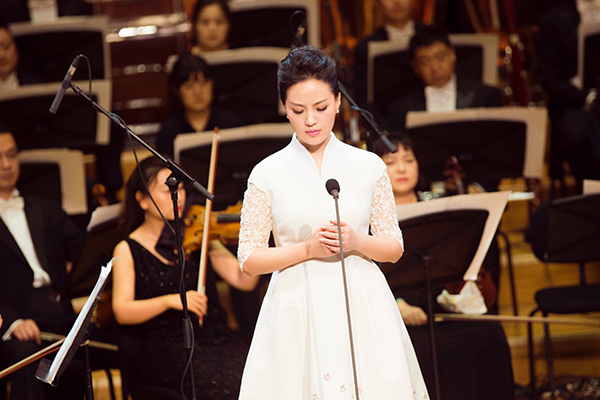 |
|
Lei Jia performs at a concert of The Songs of the Ancestors tour, a series of Chinese folk recitals spanning over a year. [Photo provided to China Daily] |
The recitals begin with Xi Caixin (Washing Cabbage), a folk song from Lei's home province of Hunan.
Lei, who was born in Yiyang, Hunan, in 1979, entered the Hunan Art School, currently known as Hunan Vocational College of Art, to study Huaguxi (flower-drum opera), an opera style unique to Hunan region.
Lei says she benefited a lot from her years of practicing flower-drum opera.
The fundamental skills she acquired equipped her to become a well-rounded musician who can excel at all kinds of stage performances, including folk operas, modern Chinese operas and recitals.
After graduation, Lei entered the China Conservatory of Music for undergraduate studies in 1997. She was later admitted to the Song and Dance Ensemble of the Political Department of the Chinese People's Liberation Army in 2002, establishing her career as a soloist singer.
During both her study and work, she was greatly influenced by Chinese folk music, and has continuously worked to further its popularization, making multiple field trips to different regions in a bid to grasp the authentic local dialect, culture and customs behind the songs.
In 2006, she released an album entitled The Sky of Dandelions, a collection of Chinese folk songs, to public acclaim. As Lei explains, the title is a metaphor for the tenacious vitality of Chinese folk culture.
Lei's another album was an all-encompassing compilation that included one song from each of the country's ethnic groups, and was gifted to foreign leaders and officials who attended the 2008 Beijing Olympics.
These recordings laid a solid foundation for Lei's academic research in folk music and her current performances.
With the aim of studying folk music on a higher level, Lei started her doctoral studies at the China Conservatory of Music in 2013, specializing in the research of vocal performance art.
"Doctoral research requires me to really think from the perspective of the entire industry. Why do we perform folk music and how?" Lei says. "At this point, I feel, in a sense, it is a mission to find the answer I have been seeking. They will not come to me right away, but I still want to try and reach a higher objective."
Tian says that the concerts prove the increasing attention being paid to folk music within academic circles, which is particularly meaningful. "With these concerts, Lei pays a tribute to folk music. It expresses the attitude of this young singer toward tradition and her belief that folk music is the origin of modern music forms."
With this recital tour, Lei intends to showcase to the world the charm of Chinese folk music, with the techniques she acquired from her in-depth research.
"Traditional Chinese art has a particularly rich soil, from which we can extract a wealth of cultural nutrients," Lei says.